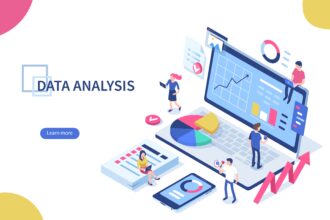When you think about tech innovation, the construction sector probably doesn’t come to mind immediately. There’s a reason for that, as the industry has been hesitant to adopt new technologies for decades. That’s starting to change, though, and construction firms everywhere are embracing innovations like big data.
Construction’s new interest in technology comes from necessity. The industry is notoriously slow and expensive, costing the global economy an estimated $1.6 trillion a year through various efficiency problems. As other sectors become faster and more productive, construction companies’ need to step into the digital age has become increasingly clear.
As a post from AutoDesk points out, big data can help make construction firms more flexible, efficient and safer, driving more teams to embrace it. Here’s a closer look at the advantages that are prompting big data’s rise in construction.
Design and Location Decisions
Big data’s usefulness in construction starts long before anyone breaks ground on a project. Designing a building and deciding where to build it is rarely a straightforward process, and mistakes here can lead to costly problems later on. Some architects have started using big data to influence these decisions, helping prevent these issues. We covered this before when we talked about using big data to create construction snag lists.
Previous project blueprints, weather trends and historical data about similar buildings provide helpful insights into a project’s location and design. This information can show where the ideal place for a building is or how a slight design change could reduce energy costs. With this info, architects can ensure projects are safer and more cost-effective from the start.
Brown University became the first college to use big data analytics in construction in 2015, and others soon followed. Portland State University and Oregon State University both saved $10 million on construction projects by using big data like this.
Budget Estimates
Traditionally, the construction industry has had trouble staying within initial budgets. In fact, 98% of construction megaprojects go at least 30% over budget. In a sector where so many factors can cause disruptions and delays, it can be challenging to produce accurate estimates. Big data offers the insight to do so.
As seemingly unpredictable as construction projects can be, most of the issues they face aren’t unique. Big data analytics engines can look at commonalities between past worksites to understand how some events impact expenses. They can then produce more reliable budget estimates.
When these estimates are more accurate, it’ll be easier for teams to stay within budget. The industry’s tendency for cost overruns can become a thing of the past. As more firms embrace big data, these estimates will grow more reliable because they’ll have more information to analyze.
Safety Improvements
Big data’s rise in construction comes from more than just cost savings. This industry can also be a dangerous one, accounting for roughly 20% of all worker fatalities in the private sector in 2019. Construction also ranks toward the top percentage of careers with the highest injury rates. Big data analytics can help.
Big data can reveal where the most injuries occur on a worksite. With this information, construction teams can revise their safety policies and practices to be more effective. Some predictive analytics algorithms could even provide actionable insights based on this info, suggesting safety improvements teams would’ve otherwise missed.
These analytics engines can continue to provide safety updates as construction progresses. For example, as the weather changes, they can warn workers of new hazards based on historical weather-related injury trends. With this data, construction teams can keep their workers safe no matter the circumstances.
Equipment Rentals and Management
Another area where construction firms are applying big data is the equipment they use. Teams use a broad range of different tools and vehicles, and there’s rarely a straightforward answer for what options are ideal. For example, there are three different skid steer sizes, and which one is best depends on the application and space allowance.
With big data, construction teams can look at the equipment they or other companies used on similar projects. This information, along with data about each project’s completion time and delays, can reveal the best tools for the job. It could even show if it’s best to buy some equipment instead of renting it.
Many companies run operating cost estimates before purchasing or renting equipment, but traditional methods can be inaccurate. Estimates from annual data can overestimate expenses by 40% and do so surprisingly frequently. Big data insights, which are much more comprehensive, can prevent these mistakes.
Waste Reduction
Most construction projects end up generating a lot of waste. The U.S. generated 600 million tons of construction and demolition debris in 2018. While construction only accounted for 10% of this, that’s still 60 million tons of trash.
Just as big data can provide more accurate cost estimates, it can also predict material needs more accurately. If teams don’t order more resources than they need, they won’t generate nearly as much waste. Big data can also inform more efficient building designs that require fewer materials to construct.
Over time, construction companies will generate a lot of data that can inform less wasteful practices. Analytics engines can then reveal possible ways to make their work more efficient. These improvements will save construction companies money and lessen their environmental impact.
Workflow Optimization
Even with all these other improvements, construction teams may still run behind schedule. Big data has helped plenty of companies in different industries remove redundancies and streamline workflows. Construction firms are starting to use it to the same ends.
Studies have found that only 30% of workers’ time goes toward actual construction work. Traveling around the worksite and coordination takes up the majority of their workday. Big data analytics can reveal where the most time-consuming inefficiencies are, helping teams create smoother workflows.
Extra work can account for as much as 35% of overall costs on a construction site, too. By turning to big data, teams can discover where they may be wasting time on unnecessary steps. As they eliminate these inefficiencies, they can do a better job staying within schedule and budget constraints.
Sustainability
As you’ve probably already assumed, construction isn’t a very environmentally friendly industry. The sector accounted for 39% of energy-related carbon emissions globally in 2018. As the threat of climate change becomes more prominent, some construction firms are turning to big data to become more sustainable.
As mentioned previously, big data can help reduce waste, which will improve the industry’s environmental footprint. Similarly, as crews work faster, they’ll run fossil-fuel-powered machinery for less time, decreasing emissions. Every step the sector takes in becoming more efficient, it becomes more sustainable.
Big data insights could also reveal novel green building practices. Analytics can show architects how to construct more energy-efficient buildings or how to incorporate recycled materials. As more companies engage in these practices, these insights will become more accurate and helpful.
Construction Is Starting to Embrace Tech Like Big Data
The traditional construction site is too inefficient, dangerous and expensive to meet the demands of a digital world. More firms are realizing this and starting to embrace new tech like big data analytics. It may not be long before the sector is as tech-centric as any other industry today.
Big data in construction may be new, but it’s already showing impressive returns. As these advantages become more evident, more companies will embrace it. Construction and all the industries that rely on it will improve across the board.










